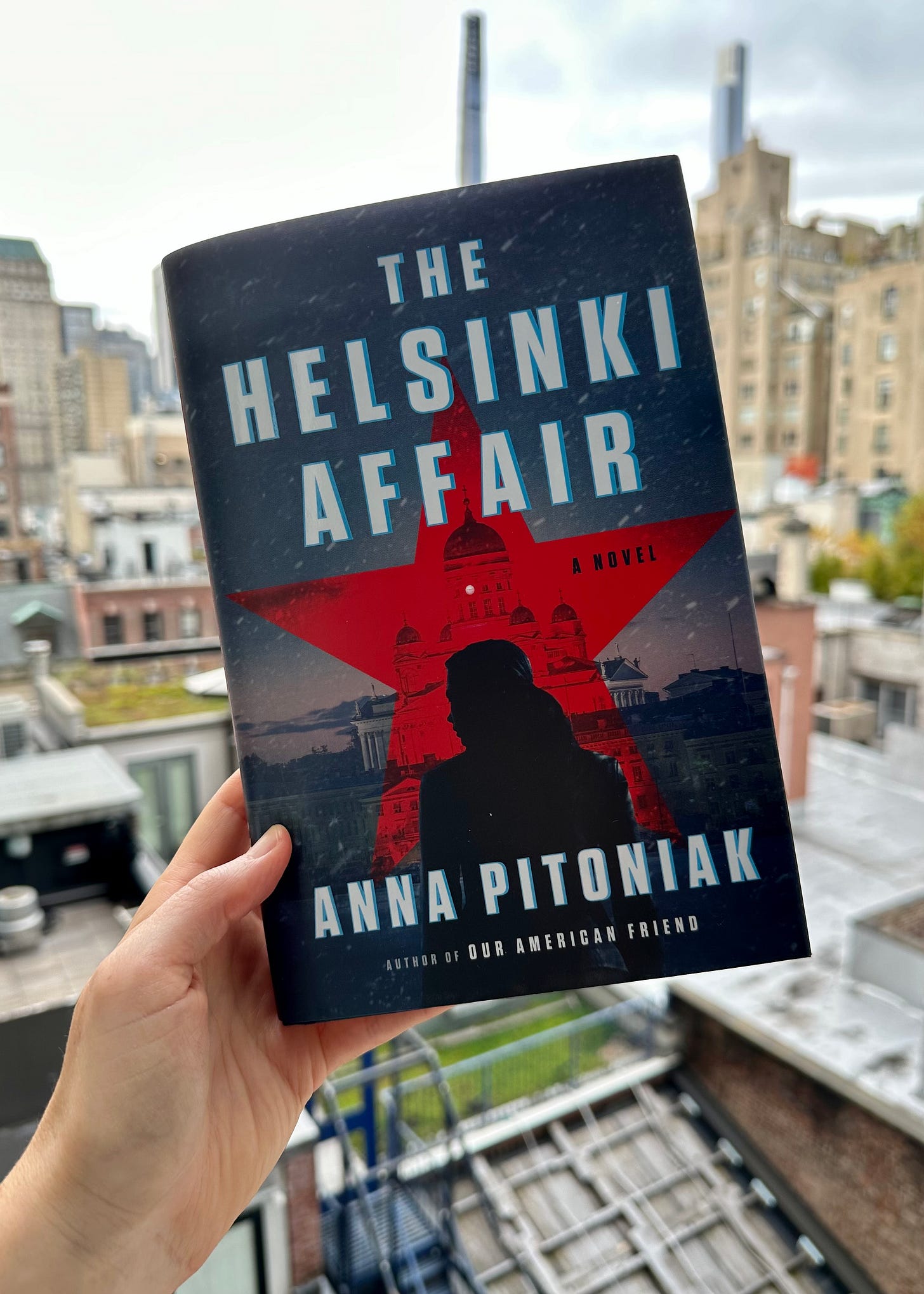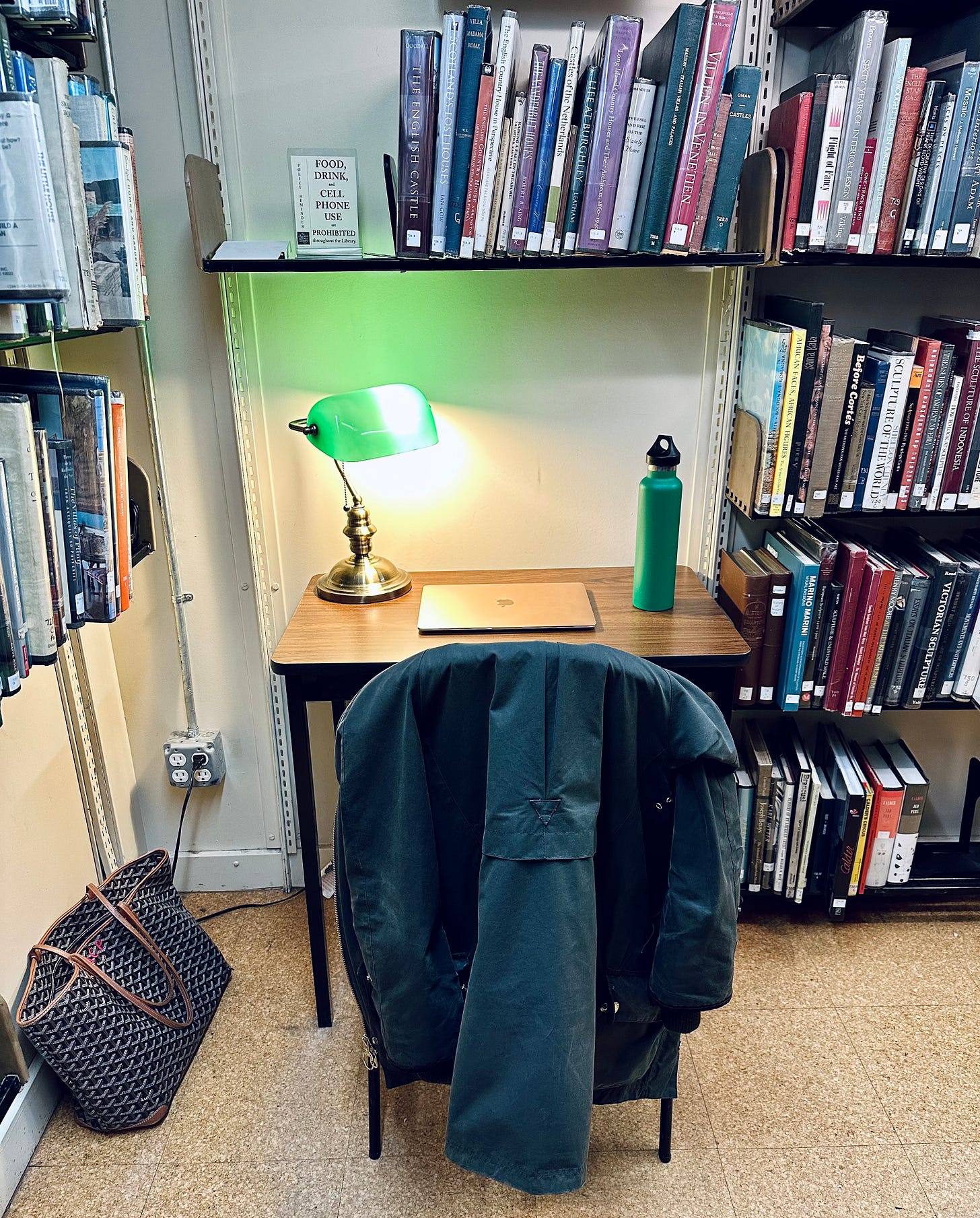On the Moment of Letting Go
Big feelings on the publication eve of THE HELSINKI AFFAIR
I’m sitting down to write this piece on the eve of publication of The Helsinki Affair, aka the last day in which I can somewhat claim that the book belongs to me, rather than to the world writ large, and let me tell you, this day is bringing with it some BIG FEELINGS.
When you’re a writer, and you’re about to release a new book, people will ask you how you’re feeling. They are probably expecting you to answer with words like “excited” or “happy” or “nervous” or “stressed,” or some combination thereof. Those are the words with which I usually answer the question—and it’s true, I am excited, I am nervous—but also, those words do a terribly inadequate job of conveying how I really feel, inside this complicated brain and heart of mine. So here I am, quelling those nerves in the way I know best: by moving my fingers across the keyboard, and trying to turn this internal murk into external clarity.
With all of the books I’ve written, to some greater or lesser degree, I’ve felt the impossibility of answering this perfectly reasonable question with any concision. I try to explain the deep weirdness of the process. Think of it like this. The book emerges from the completely intangible realm of your imagination, and now it exists as an object with physical properties, as paper and ink held together with glue or thread, as pixels on the screen of an e-reader, as sound waves being piped through a pair of headphones. It’s your name on the cover, but that merely indicates that you were the author of the book, that you spend hours, days, months, years, transforming these imaginative impulses into a (hopefully) coherent story. According to the contract you signed, this is your intellectual property, but the actual book—it is now out in the world, far from your grasp, far from your control, and there’s not a damn thing you can do about it. In fact, publication was your goal all along! And you are happy that you reached this goal. But you are feeling about a hundred other things above and beyond simply happy.
I feel very proud of this book. I’m proud of myself for trying this new thing—writing the kind of spy novel I’ve always wanted to read—and I’m proud of the story that resulted from that trying. On this eve of publication, I am reminding myself that no matter what happens, no matter how many or how few copies are sold, no matter how many one-star or five-star reviews are written, it doesn’t have to alter that sense of pride. This is often easier said than done. I’m a human being, I get my feelings hurt, too! Reading a bad review can really suck! It can really ruin your afternoon. (Reason number one million why an author should never ever ever read her own Goodreads reviews.) But on this eve of publication, I want to remind myself that, even though it’s hard, it is possible. I’ve seen other people embody this kind of calm self-assurance; and I want to embody it myself, too.
It definitely comes easier to some than others. I was one of those kids who always loved getting good grades, one of those employees who always loved being told I did a good job. I often joke that this was the hardest part about quitting my day job. When you’re a full-time, self-employed writer, there is no one to pat you on the metaphorical head and tell you, Hey, thanks, great job with that assignment! Instead you have to learn to do this for yourself. There are some days when it’s pretty easy: you hit your word count, or you get a nice review, or you receive a kind email from a reader. But there are other days, lots of days, when the writing is sluggish and slow, or you get a bad review, or you hear about another writer who just received some accolade that you really wish you had, too. On those days, you wonder: can I still feel proud of myself?
Again: doesn’t always come easy. If I’ve just had a bad day, I’m not likely to pat myself on the metaphorical head and say, Great job, Anna, you’re killing it! But I’ve realized that, when I have one of those bad days, and then the next morning I wake up, and I get back to my desk, and I don’t let the previous day’s discouragement prevent me from opening the computer and beginning to type and trying again, then I begin to recover my sense of pride. So maybe yesterday was a shitty day, but I’m stubborn, damnit, and here I am being stubborn, and if nothing else, I can be proud of that stubbornness.
A book is a product of the author’s effort. But when it’s done right, the writing itself is the alchemy that transforms the author’s effort into the reader’s ease. The feeling of picking up a book and having the words cast a spell over you, the feeling of being swept into the story from the very first page—that’s what we’re after. The writer spent hundreds, or more likely, thousands of hours writing a book. The reader might finish it in six or eight or ten. Language compresses the unwieldy imaginings into a tight jewel of a story. It’s the gift you’re always trying to give to the reader.
This is part of what makes the publication moment so weird, so contradictory. A book is a miniature world that an author can create and re-create, can write and rewrite, trying it this way, then trying it that way. Writing a book is like a strange tango in which you, the writer, are both partners at once: like a dance between what you can imagine and what you can communicate, between what you can feel and what you can describe. This strange dance is how the book comes into existence. But then you, the writer, reach a certain point where you start to share it with the world—first with your agent, then with your editor, then the sales and marketing and publicity teams, then the booksellers, then the media—and the dynamic changes. Other people have opinions about the book. The opinions are valid. Sometimes they are negative! They are still valid. Sometimes you wish they could have been in the room with you, as you did that strange dance of conjuring. Sometimes you wish they could see why it came out the way it came out, why this character made the decisions she made.
The process of publishing a book is the process of realizing that this isn’t possible. You can’t bring them into that room, because the room in which the book was written no longer exists. It was a room that existed in time, not in space.
I started writing The Helsinki Affair on April 21, 2020. It’s been more than three and a half years since that day. I’ve moved. I’ve bought a house. I’ve lost family members. I’ve gained a niece and a nephew. I’ve voted. I’ve been vaccinated. I’ve made new friends. I’ve traveled to new places. I’ve shown up for the people I love; I’ve disappointed the people I love. I’ve had happy days and sad days, easy days and hard days. When I step back and try to tell a story about those three and a half years, I find that I can’t. Too much happened to fit within the confines of a story! But those years formed the room in which I was able to tell a different story, a story that isn’t about me, but a story into which, nonetheless, I was able to pour my whole heart.
Sometimes it takes until this very moment, right at the end of the road, to realize how much that room meant to me. It was a room to which I could retreat, over and over again, no matter what the wider world was like, no matter how little control I had over that world. I love The Helsinki Affair for what it will hopefully give to a reader—but I also love it for what it gave to me.
Before I let you go—a favor! In case you haven’t heard (lol), The Helsinki Affair comes out tomorrow. (Have you preordered it yet?? tIf you haven’t, and if it’s still November 13 when you’re reading this email, you can still use the code AFFAIR at Tertulia to get 20 percent off your preorder!) In the coming days, if you get the chance to read the book, and if you enjoy it, could you take two minutes to leave a review on Amazon or Goodreads? These reviews are an enormous help, especially in the early weeks.
Or maybe you want to post about it on social media? Or maybe you want to share it with your book club, or your coworkers, or your parents’ group? Or maybe you want to forward the link to this Washington Post review (over which I am still pinching myself!) to your spy-thriller-loving friends and family, and encourage them to check this one out? Or maybe you want to come to an event in New York (11/16), or D.C. (11/18), or Philadelphia (11/20)?
Every little bit helps. Writing a book is labor of love, but publishing a book is an act of community, and I am so grateful for the ways in which readers and writers—and librarians, and booksellers, and reviewers, and more—come together to collectively form this community. It’s all about word-of-mouth, in the end, and it’s your words that ultimately make it happen. THANK YOU.




Great and we’ll deserved WaPo review. On the days it’s hard patting yourself on the head, imagine me or another writer friend doing it for you
Just started reading. Got a little taken out of the story when Gasko is talking about failed coups of the 60s and 70s, considering the failed regime changes of the past two decades.
Wonderful prose though.